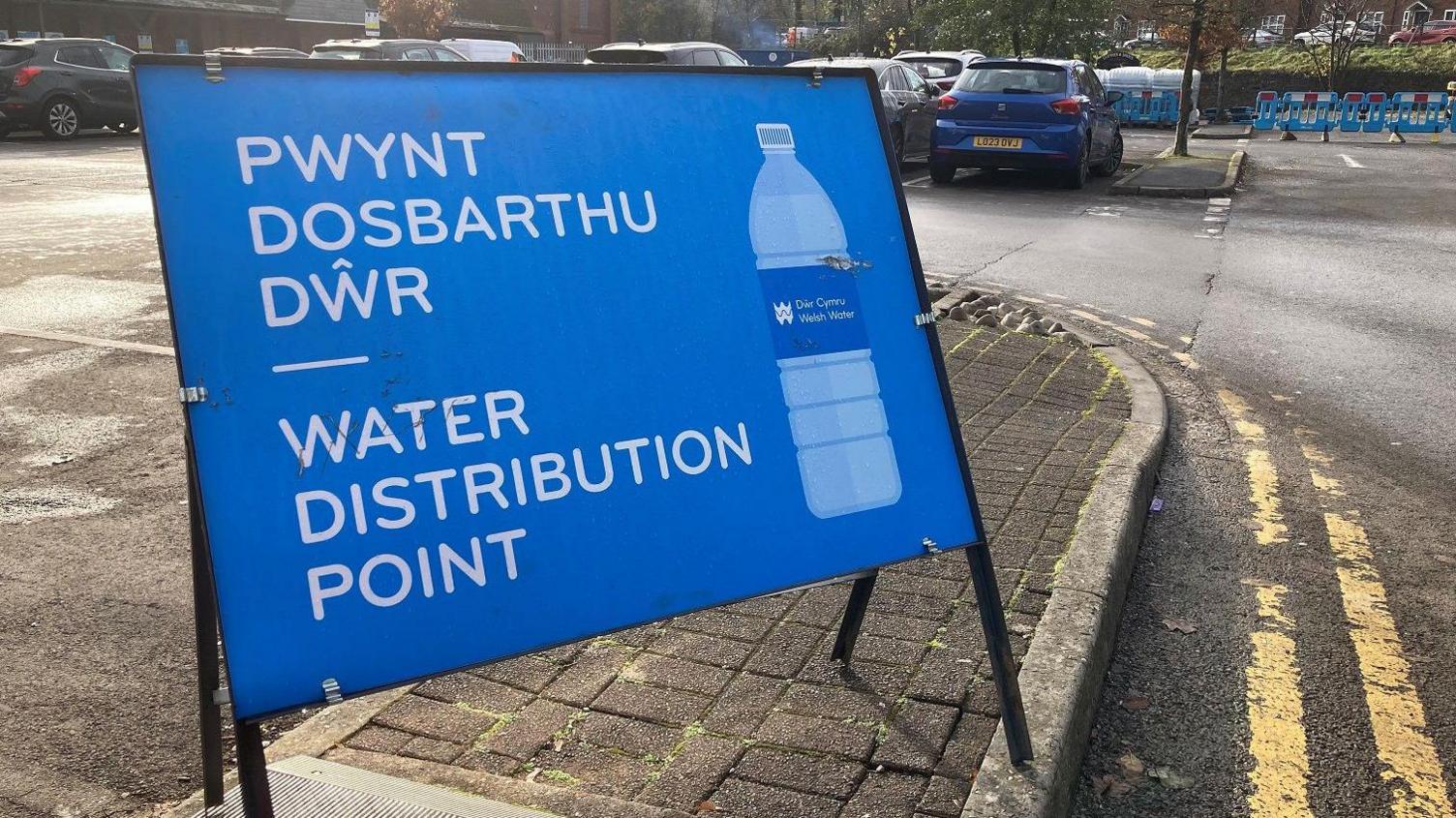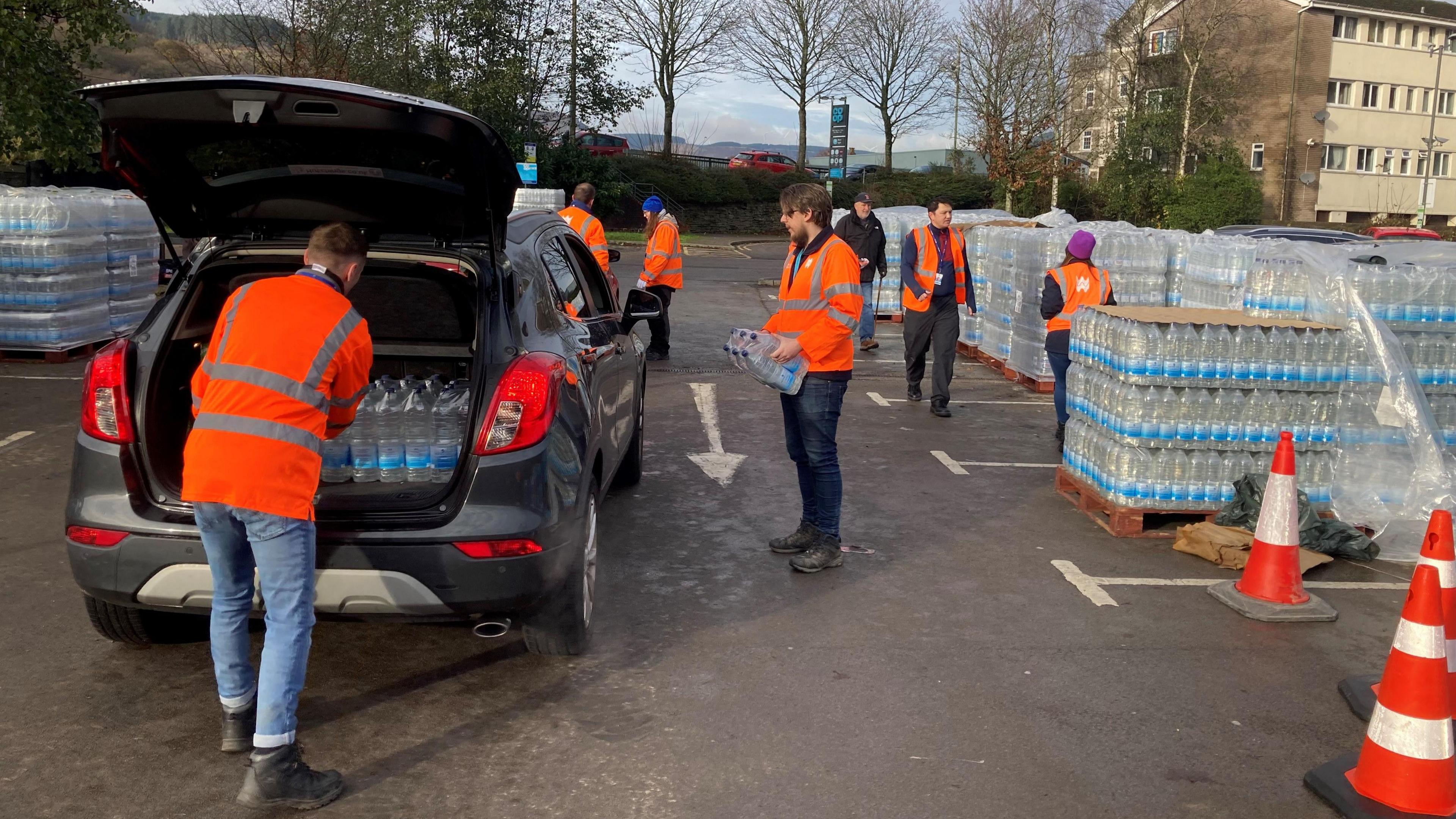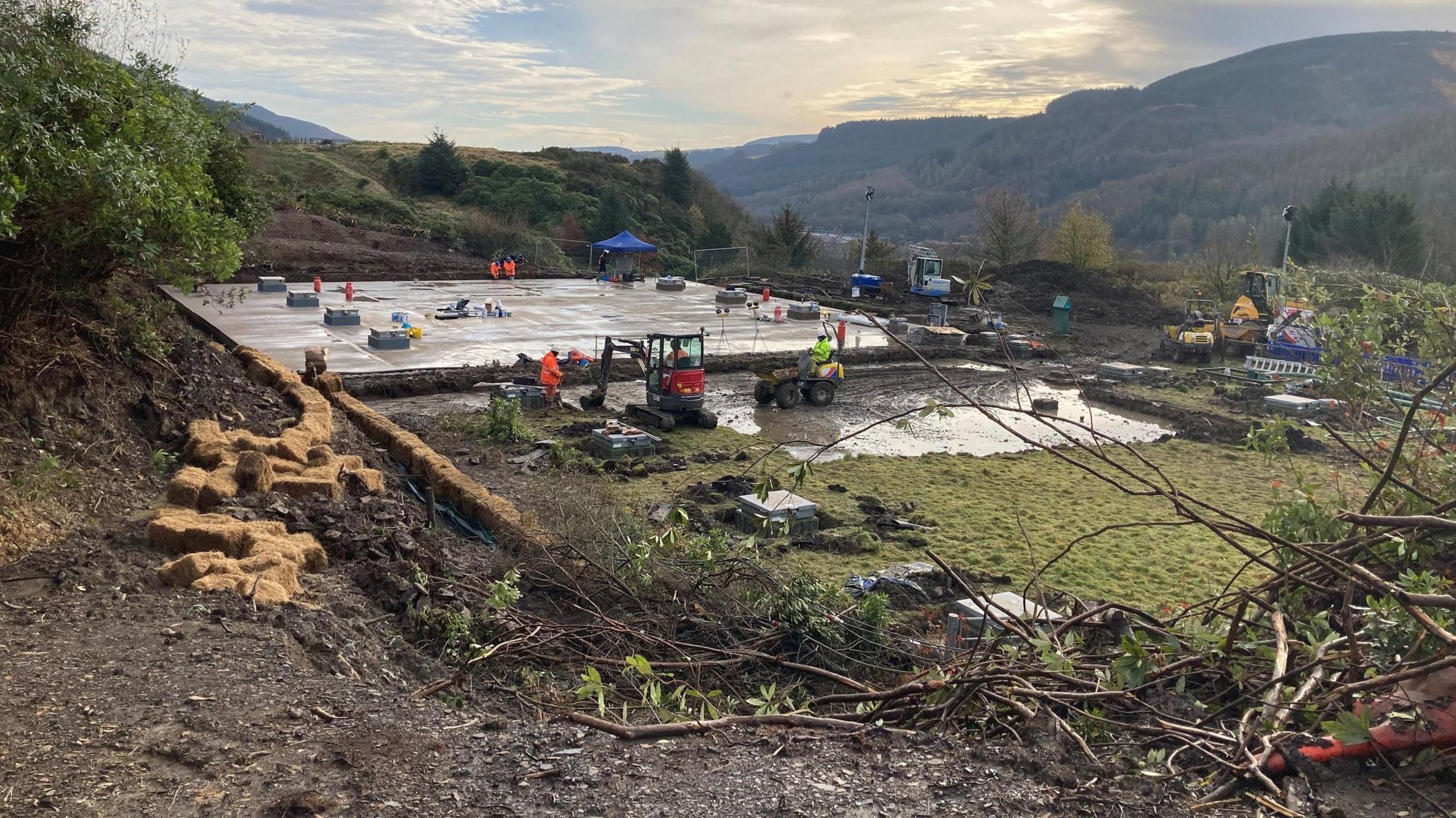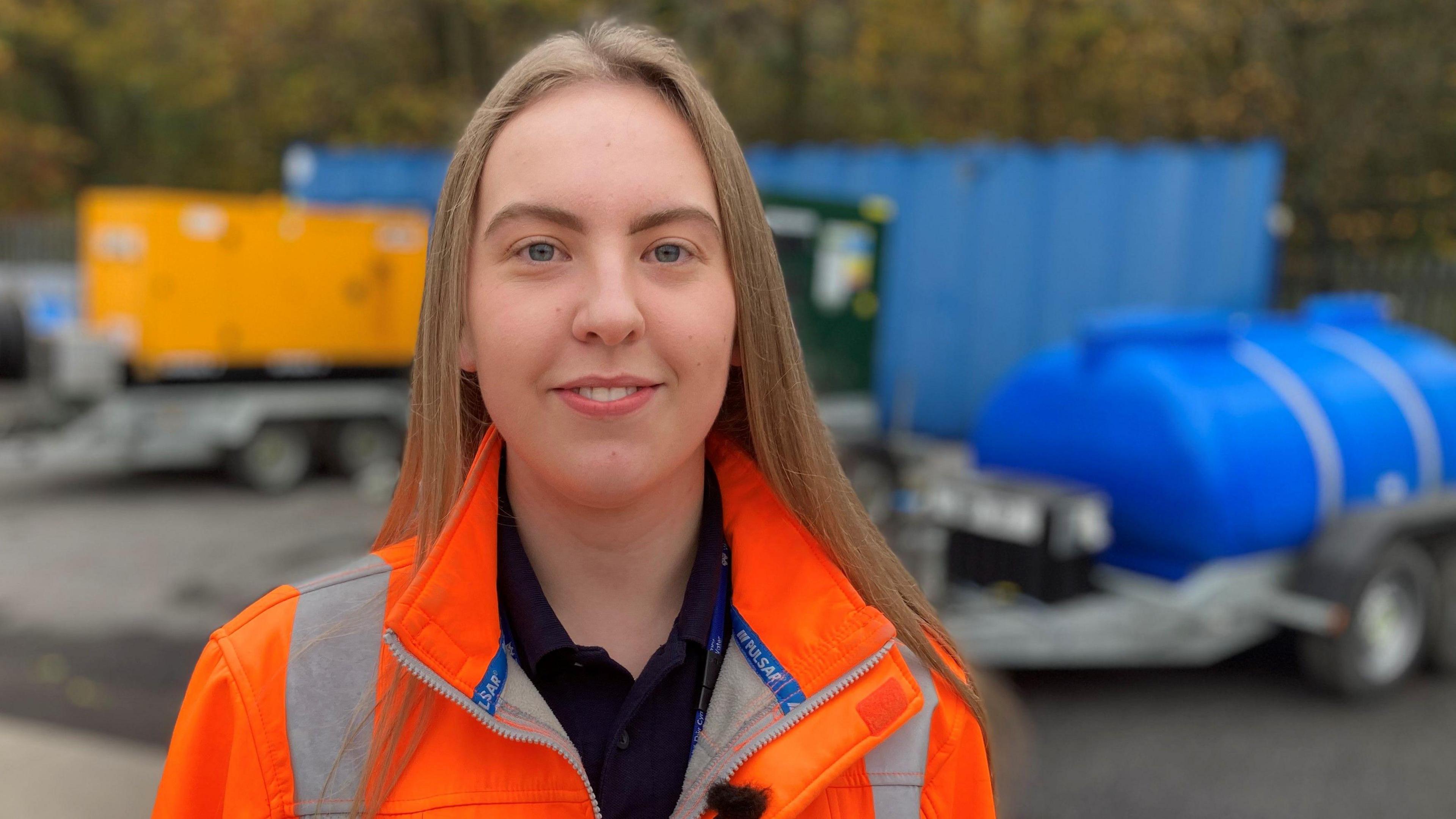Thousands must carry on boiling water after storm

Three bottled water stations have been set up in areas affected by the boil water notice in Rhondda Fawr
- Published
Thousands of people have been told to boil their tap water for another week as repairs continue at a treatment works that flooded during Storm Bert.
Dŵr Cymru Welsh Water has apologised and increased its offer of compensation to affected customers and businesses.
Its chief executive said teams were working "24/7" to try to fast-track a fix to the drinking water storage tank at Tynywaun treatment works, above Treherbert in Rhondda Cynon Taf.
Nearly 100 staff were involved in managing the incident, manning bottled water stations and delivering supplies to vulnerable customers, he said.
Flood warnings an hour late, says council leader
- Published27 November 2024
How are flood alerts and weather warnings set?
- Published25 November 2024
Your pictures: Storm Bert brings snow, wind and rain to UK
- Published23 November 2024
A "boil water notice" was issued to about 12,000 Rhondda households last Sunday and that has now been extended until Sunday, 8 December.
It applies to residents in Blaenrhondda, Blaencwm, Tynewydd, Treherbert, Treorchy, Cwmparc, Ton Pentre, Gelli, parts of Pentre, Tonypandy and Ystrad.
Fourteen schools, two hospitals, eight care homes and 17 childminders are also being provided with alternative water supplies, via tankers or bottled water deliveries.

Victoria Vickery's new sandwich and cake shop in Treorchy has been open for only four weeks and is now having to boil all water for food preparation
"We can't serve hot drinks at the moment and when we're preparing food we've got to wash the veg and salad in boiled or bottled water," said Victoria Vickery, of Only Crumbs sandwich shop in Treorchy.
"It's taking time and obviously it's affecting us money-wise," she said.
On the high street, Janice Cook, out shopping, said it was "terrible" having to keep boiling water at home.
"You forget sometimes and then think 'oh, I better not use that now' - it's hard work," she added.
“I won’t touch my tap,” said Ann Clarke, but added that Welsh Water had been delivering bottled water to her house as she was classed as a vulnerable customer - which was "marvellous".
Rhys Richards, a teacher, said it was "certainly inconvenient and less than ideal at this time of year with Christmas on the horizon".
He felt Welsh Water had been clear with it messaging and communication - "but let's hope they can sort it soon."

Welsh Water says it has handed out more than 150,000 bottles of water so far
In a letter to residents, Welsh Water chief executive Peter Perry said the weather gauge at Tynywaun had measured "the second highest rainfall in the UK last Saturday and Sunday".
"This resulted in a significant amount of flooding (at the treatment works) and surface water running from the hill onto the drinking water storage tank and impacting the tank."
Mr Perry said the required fix to reseal the tank would usually take "over a month", but staff were working "flat out" to try to get it done in two weeks.
Ongoing rainfall had hampered efforts, as dry conditions were needed to lay protective membranes, he added.
"We understand the inconvenience this has caused for customers... and we'll do all we can to bring that boil notice off as quickly as possible."
A further £100 is now being offered to affected households, on top of £150 already pledged, while businesses will be offered a total of £500.
Meanwhile, Rhondda Cynon Taf council is offering a £1,000 grant for affected businesses and residents, and it said on Thursday that 192 applications had been received so far.
The council said that about 249 properties were hit by flooding inside their premises due to Storm Bert.
A further 140 resident and business properties have been flooded across Caerphilly, according to the council.
Elsewhere, Powys council have confirmed that 16 properties have suffered flood damage. Powys does not currently have a financial assistance scheme, but is seeking support from the Welsh government, and anyone hit by flooding can apply for council tax relief.

Welsh Water says it needs a period of dry weather to install waterproof membranes around the drinking water tank at Tynywaun treatment works
Welsh Water said it had spent months preparing for winter pressures, after a series of critical reports by regulators about its overall performance in recent years.
In October, the firm was ordered to pay a £24.1m penalty by Ofwat, and was one of only three water companies in Wales and England to be classed as "lagging".
The water industry's regulator criticised performance in areas like tackling supply interruptions, mains repairs, leakage and pollution incidents.
Its environmental credentials have also been repeatedly downgraded by Natural Resources Wales (NRW) - going from a four star rating (industry leading) to two (requires improvement).
Kit Wilson of Welsh Water said current scrutiny of the sector brought "even more importance" to how the firm manages the colder, wetter months ahead.

Kit Wilson of Welsh Water says the company is "embracing AI to predict where there may be blockages on our network"
"Winter is when we see the most impacts to our network, and that's becoming even more prevalent as the impacts of climate change grow stronger and stronger,” he said.
Asked why customers should have faith in the firm's preparations, Mr Wilson said it was "always disappointing when we as a company don't meet the expectations of our customers or our regulators".
"However we have a really ambitious investment programme planned for the next five years, which will invest a huge amount of money - over £4bn - into our network."
"We really think this will be a step change and start to change some of those perceptions," he said.

Welsh Water's "absolute goal is to ensure that customers are kept on supply even if there’s an issue," says operational supervisor Lauren Johns
At the firm's headquarters on the outskirts of Cardiff, Mr Wilson showed BBC Wales around its "gold room", from where incidents affecting the water network are managed.
Team leaders from various departments sat around a table, with others joining remotely, and the walls and screens around them were filled with maps and diagrams.
Mr Wilson said artificial intelligence (AI) technology was being deployed for the first time, helping predict where issues might occur - such as blockages or pollution – allowing staff "to intervene before problems can escalate".
At Welsh Water's Clydach depot, operational supervisor Lauren Johns said preparation work for winter had begun in the summer, with teams checking and maintaining tankers, generators and other equipment, and stockpiling bottled water.
Describing winter as "a real challenge", she said the company's "absolute goal is to ensure that customers are kept on supply even if there’s an issue, and ideally, never find out that there was an issue in the first place".
Mr Perry said Storm Bert was an early test of the firm's preparations for winter.
"We had an emergency planning exercise in the schedule for this week," he said.
"But now that plan is in full swing and we'll sustain that for as long as we need to."